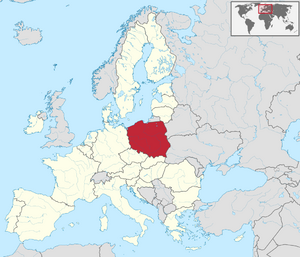User:Inkmne/sandbox
POLAND ARTICLE SANDBOX
| Republic of Poland Rzeczpospolita Polska | |
|---|---|
Map of Republic of Poland
| |

|

|
| Flag | State Emblem |
| Part of a series on |
| Former socialist states |
|---|
| List of states |
|
Albania · Bulgaria · Czech Republic · Slovakia · Germany · Hungary · Mongolia · Poland · Romania · Former Soviet Union (Armenia · Azerbaijan · Belarus · Estonia · Georgia · Kazakhstan · Kyrgyzstan · Latvia · Lithuania · Moldova · Russia · Tajikistan · Turkmenistan · Ukraine · Uzbekistan) |
| Politics |
| Opinions of socialism · Reactionism (Eurasianism · National Bolshevism · Religion · Decommunization · Anti-communist propaganda · Banderism) · Western influence (NATO expansion · Color revolutions) |
| Issues |
| Demographic crisis · Economic issues · Poverty · Post-Soviet conflicts |
Poland (Polish: Polska [ˈpɔlska]), officially the Republic of Poland, is a capitalist state in Central Europe. It has a population of over 38 million and is the fifth most populous member state of the European Union. Warsaw is the nation's capital and largest metropolis.[1]
The country has a rich history of Marxist thought. It's the home of revolutionary Rosa Luxemburg, economist Michał Kalecki and philosopher Leszek Kołakowski, known for his critical analyses of Marxism. Poles were among the founding members of the First International.[2]
Poland is a founding member state of the United Nations, as well as a member of the World Trade Organisation, OECD, NATO and the European Union (including the Schengen Area). It has the sixth largest economy in the EU by GDP (nominal) and the fifth largest by GDP (PPP). It doesn't hde an ambassador in Israel since August 202,1 and its once-close diplomatic relations with Hungary worsened due to the Fidesz government's response to the 2023 Invasion of Ukraine.[3][4]
History
Polish Lithuanian-Commonwealth (1569-1795)
Population and Economy
The Union of Lublin of 1569 established the Polish-Lithuanian Commonwealth, a unified federal state with an elective monarchy but largely governed by the nobility. Its multicultural and relatively tolerant society was unique in Europe, becoming home to a diverse population of Poles, Lithuanians, Ruthenians, Germans, Jews, Dutch settlers (Olędrzy), and Scots.[5] The economy was dominated by the agricultural sector, mostly comprised of a type of noble-run large enterprise, called a folwark. Serfdom benefited the nobility as the dominant class and was never abolished during the Commonwealth. Due to its large exports of grain, Poland was often called "The Granary of Europe" (Polish: Spichlerz Europy).
Urbanization within the Commonwealth presented a distinctive profile compared to Western Europe. Estimates of the Commonwealth's urban population vary greatly, from 20% to as low as 4-8%.[6][7] The preeminence of agrarian pursuits, coupled with the privileged status of the nobility vis-à-vis the bourgeoisie, impeded swift urban development and industrial expansion. The regulation of grain prices by the nobility served as a mechanism for wealth accumulation, epitomized by the prominence of trade fairs.
Political System
The political system of the Commonwealth included a unique amalgamation of distinctive, unique features. Rooted in the concept of Golden Liberty, the country's political system is difficult to compare with its contemporaries, but it can be tentatively described as a mixture of:
- federation, with regard to the broad autonomy of its regions. It is, however, difficult to decisively call the Commonwealth either confederation or federation, as it had some qualities of both;
- oligarchy, as only the szlachta (nobility)—around 15% of the population—had political rights;[8]
- democracy, since all the szlachta were equal in rights and privileges, and the Sejm could veto the king on important matters, including legislation (the adoption of new laws), foreign affairs, declaration of war, and taxation (changes of existing taxes or the levying of new ones). Also, the 15% of the Commonwealth population who enjoyed those political rights (the szlachta) was a substantially larger percentage than in majority European countries even in the nineteenth century; note that in 1820 in France, only about 1.5% of the male adult population had the right to vote, and in 1840 in Belgium, only about 5%.[9][10][11][12]
- elective monarchy, since the monarch, elected by the szlachta, was Head of State;
- constitutional monarchy, since the monarch was bound by pacta conventa and other laws, and the szlachta could disobey any king's decrees they deemed illegal.
- ↑ "Poland country profile". BBC News. Retrieved 14-12-2023.
- ↑ Documents of the First International. The General Council of the First International, 1864-1866. The London Conference 1865. Minutes. Foreign Languages Publishing House. Moscow. 1964, p. 1
- ↑ Rigamonti, Magdalena. "Polska nadal bez ambasadora w Izraelu. Minister Sikorski: Braun nie będzie dyktował mi co mam robić". Onet. Retrieved 14-12-23.
- ↑ Tilles, Daniel (2022-07-30). ""The paths of Poland and Hungary have diverged," says Polish PM. Notes From Poland. Retrieved 2023-14-12.
- ↑ Kopczyński, Michał; Tygielski, Wojciech (2010). Pod wspólnym niebem. Narody dawnej Rzeczypospolitej (in Polish). Warszawa: Bellona.
- ↑ Institute of History (Polish Academy of Sciences) (1991). "Volumes 63–66". Acta Poloniae historica. National Ossoliński Institute. p. 42.
- ↑ Allen, Robert. "Economic Structure and agricultural productivity in Europe, 1300–1800" in: European Review of Economic History, 3, 1-25. Cambridge University Press. 2000. p. 8
- ↑ Aleksander Gella, Development of Class Structure in Eastern Europe: Poland and Her Southern Neighbors, SUNY Press, 1998, p. 13
- ↑ David Sneath (2007). The headless state: aristocratic orders, kinship society, & misrepresentations of nomadic inner Asia. Columbia University Press. p. 188.
- ↑ M. L. Bush (1988). Rich noble, poor noble. Manchester University Press ND. pp. 8–9.
- ↑ M. L. Bush (1988). Rich noble, poor noble. Manchester University Press ND. pp. 8–9. ISBN 0-7190-2381-5.
- ↑ M. L. Bush (1988). Rich noble, poor noble. Manchester University Press ND. pp. 8–9. ISBN 0-7190-2381-5.
